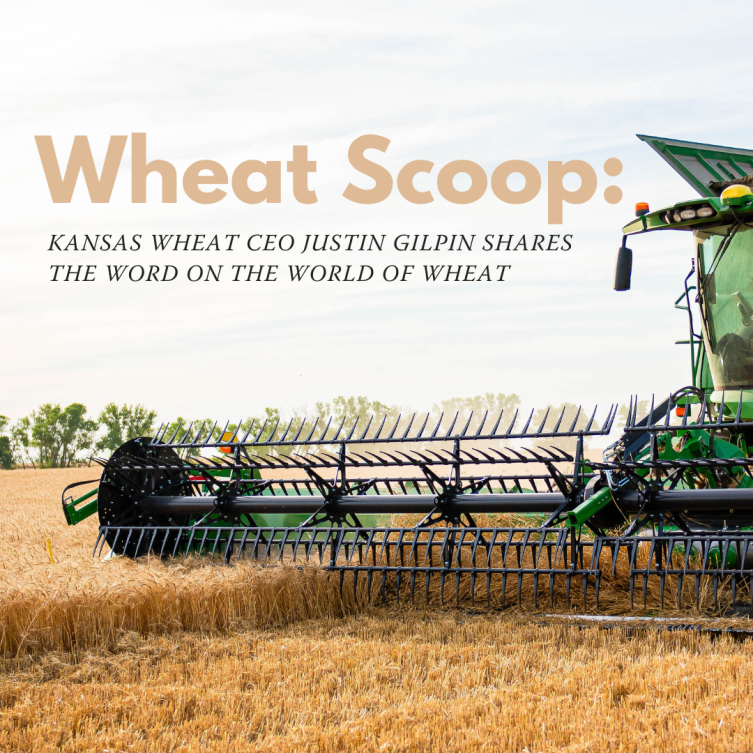Breadcrumb
- Home
- Wheat Scoop: Kansas Wheat CEO Justin Gilpin shares the word on the world of wheat
Kansas Wheat CEO Justin Gilpin joined the Wheat’s on Your Mind podcast this week to share his perspectives on the 2024 harvest, the new wheat export marketing year, Kansans serving as industry leaders and more.
No conversation with Gilpin can start in early July without commentary on harvest results. Talking with Aaron Harries, Kansas Wheat vice president of research and operations and host of the Wheat’s on Your Mind podcast, he commented that the phrase “better than expected” is the year’s common theme, but one that needs to be put into context.
“The fact that we are having a better crop in a lot of areas than we’ve had in the last couple of years, it is good to see,” Gilpin said.
He echoed farmer hopes from last winter of good prospects for harvest, having seen good stand establishment in the fall. But as the rains did not come for many, the crops started deteriorating through March, April and early May. As the combines started to roll, variability became the name of the game.
“Even within the same county and within miles of each other, you’re seeing pretty wide ranges in yields and overall performance from the wheat as it’s coming in,” Gilpin said. “That has to do with variety, whether somebody caught a rain, whether you were hit by a freeze or whether you’re seeing disease. This is one of those crops that have it all over.”
Gilpin and Harries both tipped their hats to wheat breeders and scientists for the genetics in today’s wheat varieties that allowed the crop to maximize the moisture it did receive - allowing farmers across the state to harvest fields they thought would not make it through the dry spell.
“We know that the genetics are better now than they were 10 years ago,” Gilpin said. “We know that farmers are implementing management practices that give the wheat crop a chance to have higher yield potential than we did a year ago. We just needed Mother Nature to cooperate.”
“We’re seeing that not just within the public varieties that are out there, but certainly the private varieties that are out there as well. It’s a real testament to the breeders, but then also the farmers that have worked to make that investment into those breeding programs.”
As Gilpin talks with Kansas producers, he’s listening for which of those public and private wheat varieties are performing well in test plots and farmers’ fields. One variety he’s on the lookout for is KS Bill Snyder - a new variety that will have limited seed available this fall for planting.
“With its disease package and yield potential, and with that name recognition, hopefully, it’ll be as worthwhile as that variety’s namesake,” Gilpin said, referring to K-State’s legendary football coach for which the new variety is named.
Gilpin and Harries also discussed the need for markets to cooperate to help farmers get the return on acre they need to maintain their operations - especially after emerging from a multi-year drought. The futures market has been rough on wheat, taking nearly a $1.50 break from the start of harvest, driven by harvest pressure, investment funds and global wheat market announcements.
“At the end of the day, you need that return per acre to ultimately define how good that wheat crop is for each of our producers,” Gilpin said. “Hopefully, if we do what we can, working with our breeding and research community to put those genetics in place, the capability of good yields can help out on that return per acre.”
In addition to discussing this year’s harvest, the conversation covered the latest announcements from Turkey and Russia about their wheat supplies, a strong start to the new wheat export marketing year, how border security issues are impacting rail delivery to Mexico, the climate-smart value of having wheat in crop rotations, Kansans in industry leadership programs and more.
Listen to the full discussion and check out other episodes of the Kansas Wheat podcast at https://wheatsonyourmind.com/.
###
Written by Julia Debes for Kansas Wheat

